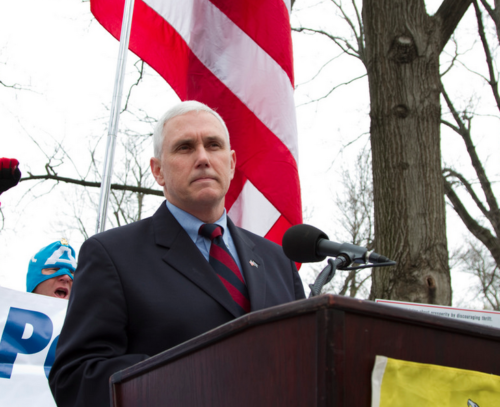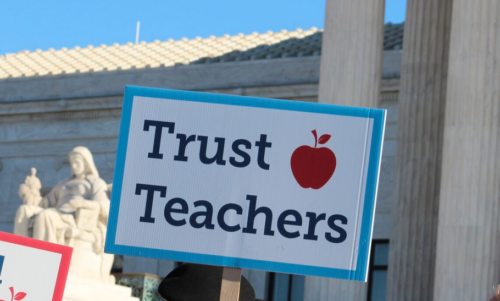By Liza McFadden
My great-grandparents emigrated from Westport, Ireland and I’ve traveled to see the home they left. In the summer it’s a charming, whitewashed building with a picturesque view of the harbor that belies the hunger and hardship that motivated its residents to seek a better life across the ocean.
I’m reminded of this image daily in my work as a literacy advocate. Not too long ago, myself and Doro Bush Koch, Honorary Chair of the Barbara Bush Foundation for Family Literacy, visited families in our Rockville, Maryland program, most of whom had come to America seeking relief from dire poverty in Guatemala. One mother cried when sharing with us that due to funding constraints, she would have to leave the program when her son turned four and went to preschool.
Despite our knowledge that a mother’s educational level is the number one determinant of a child’s likelihood to graduate from high school, we’re going backwards. Enrollment in adult literacy and English Language Learning programs has declined by 27% since 2001. The recession steamrolled dreams: in Los Angeles alone there was a decline of over 800,000 students served from 2008 to 2013, and local adult literacy waiting lists are in the thousands.
I believe in order to address these problems, it is time to consider all options that increase access and opportunity. Why aren’t innovative education reform models found in the K-12 system more prevalent in adult education? I believe we could benefit from studying both successful and emerging implementations of these models. For example:
- Sonia Gutierrez,who is considered both a Hispanic rights activist and literacy leader, championed the rights of adult literacy students, and in 1998 the Carlos Rosario International Public Charter School was awarded the first adult charter school in Washington, D.C.
- Briya Public Charter School in Washington, D.C. is the nation’s only family literacy charter school, providing both adult and early childhood education. Briya was established in the late 1980s via federal funding and funding from the Barbara Bush Foundation.
- Goodwill’s expansion of their charter efforts in Indianapolis, Texas, Tennessee, and D.C., which I am eagerly following.
As Jeanne Allen, Founder and CEO of the Center for Education Reform, shares, there’s a lot we can learn from the K-12 charter school world – which has shaken up the traditional K-12 system by bringing in new partners, methods, and ideas about how to address ALL students’ learning needs. And there are clear lessons learned: if charters don’t set and clearly articulate agreed-upon community goals, they can be closed. As Allen shares in this video clip, she believes that “the power of adult literacy applied to charter schools is really unbridled,” and full of potential to improve the lives of individuals, their families, and their entire communities.
With 36 million low-literate adults in the U.S. — many of them parents like the ones I met in Maryland, whose children depend on them to help lay the educational foundation necessary to break the multi-generational cycle of social and economic disadvantage — we must adopt a fresh perspective on adult literacy. It is imperative that we expand our conversations to include new ideas and innovative partnerships. As Albert Einstein said, “We cannot solve our problems with the same thinking we used when we created them.”
Liza McFadden is President and CEO of the Barbara Bush Foundation for Family Literacy.


















“For Too Many Families, The Skies Have Not Cleared”: Massachusetts’ Time To Shine for Education Opportunity
On Thursday, July 14th, Massachusetts Governor Charlie Baker stood in front of the State House among families, students, legislators, and residents to advocate for the importance of expanding educational opportunities for children.
Students and their families — likely some of the more than 32,000 on charter school wait lists — echoed throughout the downpour of rain as they chanted, “lift the cap!” in support of lifting current limitations — or a “cap” — on charter schools in the Bay State. Currently, there are limits on the number of charter schools allowed to open in Massachusetts, the number of students allowed, and funding limitations.
Recently, Question 2 was added to November’s election ballot as a way to give residents a voice in whether authorizing either the approval of up to twelve new charter schools or the expansion of student enrollment in existing charter schools would provide more opportunities for students to succeed academically.
During the rainy rally, Governor Baker stated that “for too many families and too many kids, the skies have not cleared, the sun has not shined…too many do not get the chance and opportunity to go to the school of their choice and to have the chance to fulfill their dream that most kids and their families do in the Commonwealth.”
As Governor Baker and the families behind him rallied for greater parent power through charter schools, the skies cleared and the sun began to shine possibly signifying that the Commonwealth of Massachusetts is ready for a bright change of opportunities.